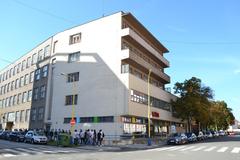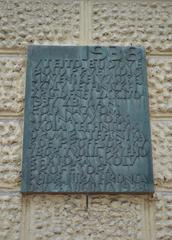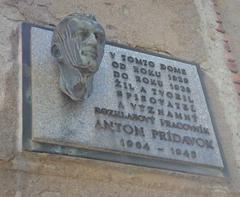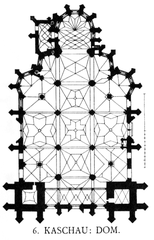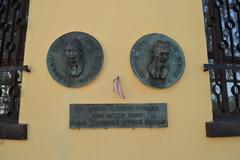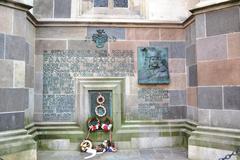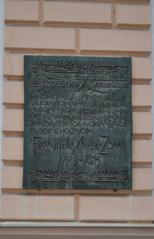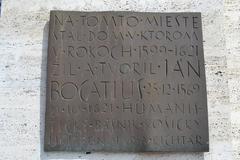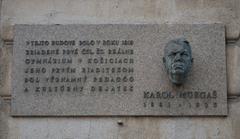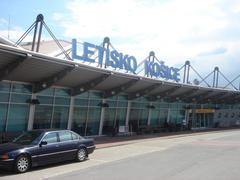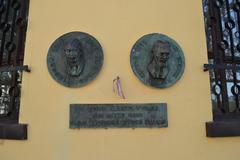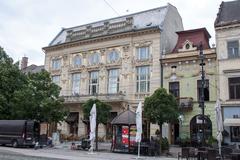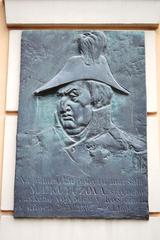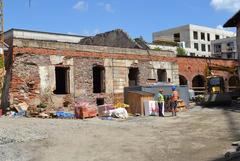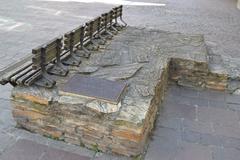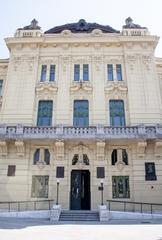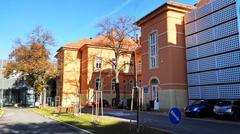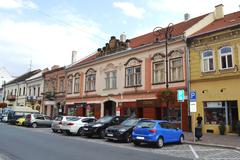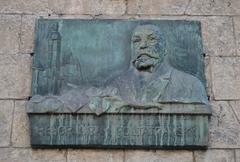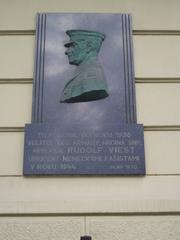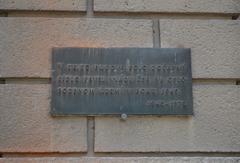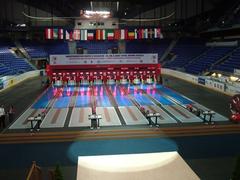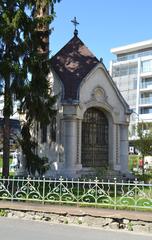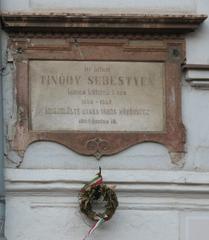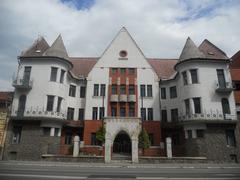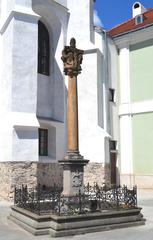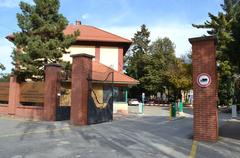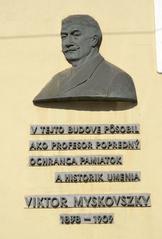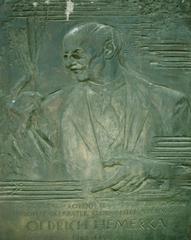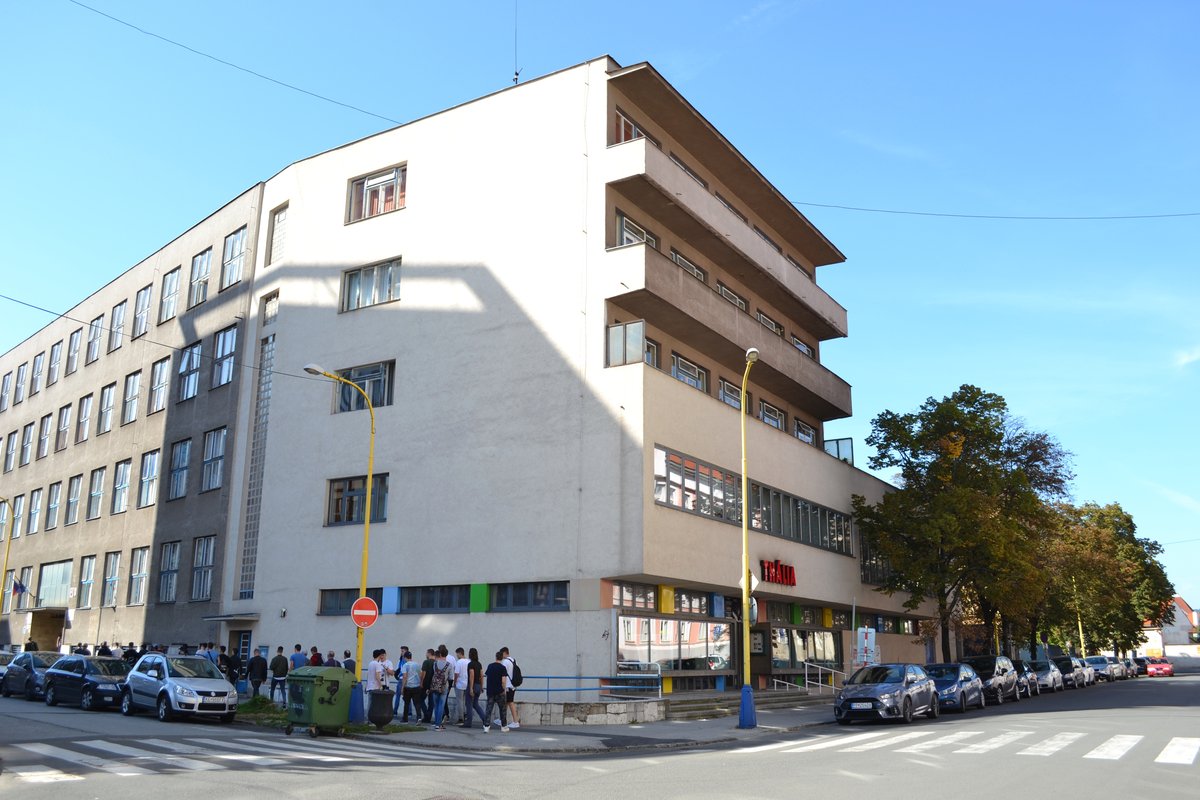
Košické Divadlo Thália Színház: Visiting Hours, Tickets, and Historical Significance in Košice, Slovakia
Date: 14/06/2025
Introduction
Located in the dynamic and multicultural city of Košice, Slovakia, Košické Divadlo Thália Színház is a cornerstone of Hungarian-language theatre and a vital cultural institution. Established to serve the Hungarian minority community, the theatre has grown into a hub for artistic excellence, intercultural dialogue, and the preservation of minority heritage. Whether you are a theatre enthusiast or a traveler looking to explore Košice’s rich cultural fabric, this guide provides a comprehensive overview—including the theatre’s history, architectural journey, visiting hours, ticket information, accessibility, and travel tips.
For the latest programming, ticketing, and events, consult the official website and local resources, which also highlight nearby landmarks such as St. Elisabeth Cathedral and the East Slovak Gallery (Invisible Mag).
Table of Contents
- Historical Overview
- Cultural Significance and Mission
- Visiting Hours and Ticket Information
- Accessibility and Visitor Amenities
- Travel Tips
- Programming Highlights
- FAQ
- Nearby Attractions
- Conclusion and Recommendations
- References
1. Historical Overview
Origins and Foundation
Košické Divadlo Thália Színház was established in 1969 during a period of significant political and cultural change in then-Czechoslovakia. Recognizing the importance of Hungarian-language theatre for the local minority, the theatre was founded to provide a professional platform for Hungarian drama and culture. The inaugural performance, Carlo Goldoni’s Servant of Two Masters, took place on November 29, 1969, marking a milestone in the cultural life of Hungarian communities in eastern Slovakia (Košické Divadlo Thália Színház official site).
Architectural Evolution
Initially, the theatre operated from improvised spaces, such as a local school gymnasium and shared venues like the State Theatre and cinema Dukla. Despite the absence of a dedicated building and unfulfilled plans for a new theatre in the 1970s, the company continued to thrive—and adapt—through creative use of available spaces.
Permanent Home and Renovation
Major change came after 1989, when the theatre acquired a 1930s functionalist building at the intersection of Timonova and Mojmírová streets. Renovations led by architects Peter Pásztor and Radoslav Jankovič between 1994 and 2002 transformed the space, adding a studio theatre (named after Sándor Márai), modern office facilities, and a community center. Further upgrades in 2005 enhanced accessibility and comfort, securing the theatre’s place in Košice’s cultural landscape (ozembuch.sk, sk.wikipedia.org).
2. Cultural Significance and Mission
As the only professional Hungarian-language theatre in eastern Slovakia, Košické Divadlo Thália Színház plays a vital role in preserving Hungarian heritage and fostering intercultural dialogue. Its repertoire ranges from Hungarian classics to international plays and experimental works, with a focus on themes of identity, migration, and coexistence (Teraz.sk). The theatre collaborates with local institutions and participates in international festivals, strengthening its impact beyond Košice.
3. Visiting Hours and Ticket Information
Visiting Hours
- Box Office: Open weekdays from 9:00 to 12:30 and 13:00 to 17:30; also one hour before performances.
- Performance Days: Theatre doors open at least 30 minutes before the show, with performances typically starting at 7:00 PM. Weekend matinees may be scheduled at 3:00 PM.
- Season: The theatre season generally runs from September through June (kosiceregion.com).
Ticketing
- Purchase Options: Tickets are available online via Colosseum Ticket, at the theatre’s box office, and through authorized distributors.
- Pricing: Standard ticket prices range from €6 to €15, with discounts for students, seniors, and groups (slovenskycestovatel.sk).
- Reservations: Advance booking is recommended, especially for premieres and guest performances, which often sell out quickly.
For updates and the current program, visit the official website or kosiceregion.com.
4. Accessibility and Visitor Amenities
- Physical Accessibility: The theatre is wheelchair accessible with ramps, accessible restrooms, and staff assistance available upon request.
- Facilities: The main auditorium seats 205, while the Márai Studio accommodates 99, for a total capacity of 304. The venue includes a foyer, cloakroom, and a refreshment area serving light snacks and beverages during intermissions.
- Language: Most performances are in Hungarian, but major productions may offer Slovak or English surtitles/program notes (goout.net, kulturamensin.sk).
5. Travel Tips
- Location: Mojmírova 7, 040 01 Košice, Slovakia. The theatre is centrally located, a short walk from Košice’s main square and major attractions.
- Public Transport: Easily accessible by tram and bus; the main railway station is 1.5 km away (ozembuch.sk).
- Parking: Public parking available nearby but limited during major events.
- Eco-Friendly Options: Bike and e-scooter rentals are widely available in Košice.
6. Programming Highlights
Košické Divadlo Thália Színház offers a diverse program, including:
- Hungarian classics and world drama
- Modern Hungarian and Slovak plays
- Experimental and children’s theatre
- Special productions during festivals and the annual season
Recent highlights include adaptations of Sándor Rideg’s work, Molière’s Tartuffe, and Chekhov’s Lesný duch (eastmag.sk).
7. FAQ
Q: What are the visiting hours?
A: The box office is open weekdays 9:00–12:30 and 13:00–17:30, plus one hour before performances. Shows usually start at 7:00 PM; check the schedule for specifics.
Q: How do I buy tickets?
A: Tickets are available online (Colosseum Ticket), at the box office, and through authorized outlets.
Q: Are there guided tours?
A: Regular tours are not offered, but special tours may be arranged during festivals or by request.
Q: Is the theatre accessible?
A: Yes, the venue is wheelchair accessible; notify in advance if assistance is needed.
Q: Can I take photos?
A: Photography is not permitted during performances.
Q: Are performances accessible for non-Hungarian speakers?
A: Selected performances offer Slovak or English surtitles; check in advance.
8. Nearby Attractions
Enhance your visit with these nearby sites:
- St. Elisabeth Cathedral: Slovakia’s largest Gothic cathedral
- The State Theatre and Puppet Theatre: Historic venues with diverse programming
- East Slovak Gallery and Museum: Regional art and history
- Tabačka Kulturfabrik: Contemporary arts center
- Hrnčiarska Street: Artisan shops and galleries
All are within walking distance of the theatre, making it easy to combine cultural experiences (myglobalviewpoint.com).
9. Conclusion and Recommendations
Košické Divadlo Thália Színház is more than a theatre—it is a vibrant cultural landmark reflecting the rich Hungarian heritage and artistic innovation of Košice. With accessible facilities, affordable ticketing, and a dynamic program, it welcomes both locals and international visitors to experience the best of minority culture in Slovakia.
For the latest information on performances, tickets, and special events, visit the official website. Stay connected via social media for real-time updates and exclusive content. Download the Audiala app for personalized cultural recommendations and seamless ticketing across Košice.
10. References
- Košické Divadlo Thália Színház official site
- Invisible Mag article on Košice’s Hungarian community
- Teraz.sk coverage of Košické Divadlo Thália Színház
- Divadlo Thália Színház visitor guide on kosiceregion.com
- ozembuch.sk blog on Divadlo Thália Színház
- slovenskycestovatel.sk profile
- eastmag.sk theatre season preview
- myglobalviewpoint.com best things to do in Košice
- sk.wikipedia.org article
- goout.net event listing
- kulturamensin.sk coverage
